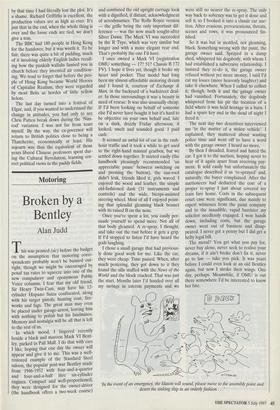Motoring
Broken by a Bentley
Alan Judd
This was penned (sic) before the budget on the assumption that motoring corre- spondents probably won't be banned out- right, though we might be encouraged by penal tax rates to squeeze into one of the new compulsory and eponymous Public Voice columns. I fear that my old friend, Sir Henry Twin-Cam, may have his 12- cylinder Hispano Suiza confiscated, along with his target pistols, hunting coat, fire- works and fags. The great man may even be placed under garage-arrest, leaving him with nothing to polish but his landmines. Memory and nostalgia will be all that is left to the rest of us. In which mood, I lingered recently beside a black and maroon Mark VI Bent- ley, parked in Pall Mall. I do that with cars I like, hoping that one day the owner will appear and give it to me. This was a well- restored example of the Standard Steel saloon, the popular post-war Bentley made from 1946-1952 with four-and-a-quarter and four-and-a-half litre six-cylinder engines. Compact and well-proportioned, they were designed for the owner-driver (the handbook offers a two-week course) and combined the old upright carriage look with a dignified, if distant, acknowledgment of aerodynamics. The Rolls Royce version — the grille being the only important dif- ference — was the now much sought-after Silver Dawn. The Mark VI was succeeded by the R Type, which was very similar but longer and with a more elegant rear end. That's probably the one I'd have.
I once owned a Mark VI (registration OMU something — 17? 51? Chassis B 172 FV). I hope it lives yet, though it broke my heart and pocket. That model had long been my almost-affordable motoring dream and I found it, courtesy of Exchange & Mart, in the backyard of a backstreet deal- er. In those surroundings it was a beauty in need of rescue. It was also unusually cheap. If I'd been looking on behalf of someone else I'd never have bought it but it's hard to be objective on your own behalf and, late on a dark, drizzly Friday afternoon, it looked, smelt and sounded good. I paid cash.
It seemed an awful lot of car in the rush- hour traffic and it took a while to get used to the right-hand manual gearbox, but we settled down together. It started easily (the handbook pleasingly recommended 'an appreciable pause' between switching on and pressing the button), the sun-roof didn't leak, friends liked it, girls waved. I enjoyed the wood and leather, the simple old-fashioned dash (31 instruments and controls) and the wide, biceps-assisted steering wheel. Most of all I enjoyed point- ing that splendid gleaming black bonnet with its raised B on the nose.
Once you've spent a lot, you easily per- suade yourself to spend more. Not all of that body gleamed. A re-spray, I thought, and take out the rust before it gets a grip. If I'd stopped to listen I'd have heard the gods laughing.
I chose a small garage that had previous- ly done good work for me. Like the car, they were cheap. Time passed. When, after much pestering, they got down to it they found the sills stuffed with the News of the World and the block cracked. That was just the start. Months later I'd handed over all my savings in interim payments and we were still no nearer the re-spray. The only way back to solvency was to get it done and sell it, so I booked it into a classic car auc- tion. After evasions, prevarications, threats, scenes and rows, it was pronounced fin- ished.
So it was but in mottled, not gleaming, black. Something wrong with the paint, the garage owner said. Sprayed in a damp shed, whispered his dogsbody, with whom I had established a subversive relationship. I insisted they re-do it, the garage owner refused without yet more money, I said I'd cut my losses (more heavenly laughter) and take it elsewhere. When I called to collect it, though, both it and the garage owner had vanished. Fortunately, the dogsbody whispered from his pit the location of a field where it was held hostage in a barn. I had a spare key and in the dead of night I freed it.
The next day two detectives interviewed me 'in the matter of a stolen vehicle'. I explained, they muttered about wasting police time and went off to have a word with the garage owner. I heard no more.
By then I dreaded, feared and hated the car. I got it to the auction, hoping never to hear of it again apart from receiving pay- ment. It sold easily but unfortunately the catalogue described it as 're-sprayed' and, naturally, the buyer complained. After the auctioneers had deducted the cost of a proper re-spray I just about covered my train fare home. Costs in the subsequent court case were significant, due mainly to expert witnesses from the paint company and to the inaudible, vapid barrister my solicitor needlessly engaged. I won hands down, including costs, but the garage owner went out of business and disap- peared. I never got a penny but I did get a hefty legal bill.
The moral? You get what you pay for, never buy alone, never seek to realise your dreams, if it ain't broke don't fix it, never go to law — take you pick. It was years before I could even look at an old Bentley again, but now I stroke their wings. One day, perhaps. Meanwhile, if OMU is out there somewhere I'd be interested to know her fate.
`In the event of an emergency, the klaxon will sound, please move to the assembly point and desert the sinking ship in an orderly fashion . .


























































 Previous page
Previous page